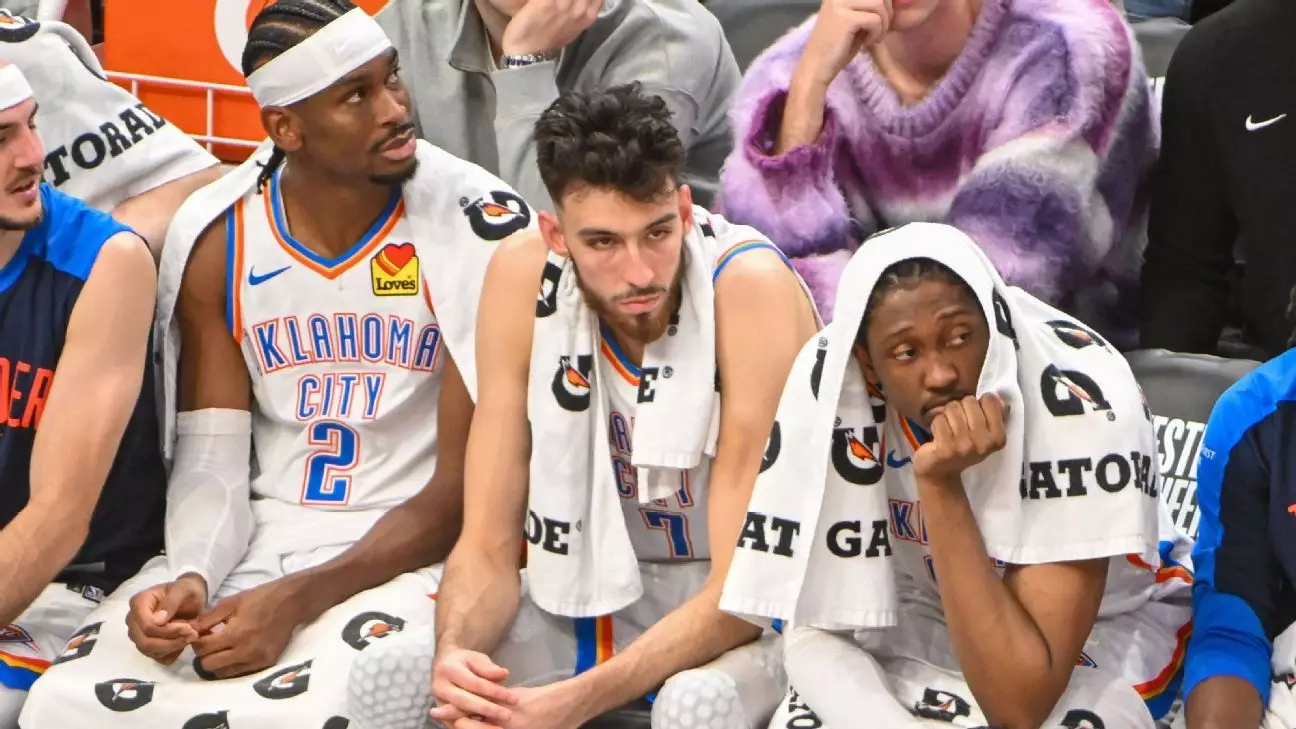There’s a brute force concealed within playoff basketball that often matches if not supersedes sheer talent. Such was the case for the Oklahoma City Thunder during their catastrophic 143-101 loss to the Minnesota Timberwolves in Game 3 of the Western Conference finals. After establishing an early series advantage, the Thunder found themselves utterly outmatched and physically overwhelmed. It’s a stark reminder that the road to victory is often paved with both skill and unrelenting intensity.
Power forward Chet Holmgren’s frank summation encapsulates the essence of the evening: “Wherever they wanted to go, they got there.” The Thunder’s struggles on both ends of the court illuminated a fundamental truth in sports; there will be nights when heart and hustle simply outshine raw capability. In many ways, this incident serves as a potent critique against the notion that athletic prowess alone can secure victories in high-stakes games.
Lack of Resilience and the Ghost of Complacency
Oklahoma City’s performance wasn’t just subpar; it was emblematic of a deeper malaise that can afflict teams basking in the glow of early success. Historically, the Thunder had rallied from a similar pitfall against the Memphis Grizzlies, overcoming a monumental deficit to seize victory. Yet this time, when pushed into a corner, Oklahoma City faltered. What transpired is a classic illustration of complacency creeping into the competitive psyche.
The Thunder’s offense was stymied. Newly crowned MVP Shai Gilgeous-Alexander, usually a source of fireworks and dynamism, fell flat with just 14 points – a number that paralleled the aspirations of his team that evening. It’s not merely the statistics that reveal a significant drop in performance; it reflects an urgent need for psychological resilience. Despite great potential, any semblance of an emphatic comeback seemed like a distant fantasy after they dropped into a 20-point hole in the first quarter.
The Coalition of Timberwolves’ Strength
Conversely, the Timberwolves exerted their dominance confidently and cohesively. With players like Anthony Edwards and Julius Randle combining for 54 points, their performance was a cogent argument for the importance of a collective effort over individual talent. Coach Chris Finch’s remarks post-game exemplified the attitude shift; they were fundamentally aggressive and competitive, traits that the Thunder seemed to exhibit only in parts.
More than just a superior scoring tally, Minnesota’s ability to play loose and aggressive without yielding fouls was critical. These traits aren’t just markers of a good team – they speak to the mental fortitude required to thrive in playoffs. Here lies a cautionary tale for Oklahoma City: when you allow your opponents to dictate the tempo and flow of the game, the scoreboard can swiftly become an unflattering reflection of your inadequacies.
The Hard Truths and Future Implications
This defeat isn’t just a temporary setback; it may pose existential questions regarding Oklahoma City’s playoff tenacity. Professional sports demand more than talent – they require unyielding spirit to battle back from humiliating defeats. The comments from both Gilgeous-Alexander and Daigneault reveal the seriousness with which the Thunder must approach their endeavors. “It’s about responding, and that’s what the next challenge is,” said Gilgeous-Alexander. It’s this acknowledgment of the need for growth that must underscore their approach in the games to come.
The Thunder’s scenario is a critical reminder that even the top defenses can falter. They allowed the Timberwolves to shoot over 57% from the field, underscoring a disparity that shouldn’t be ignored. Playoffs are a litmus test for both psychological resilience and tactical prowess; teams that thrive are those that combine a strong defense with the ability to adapt under pressure.
In essence, Oklahoma City needs not just tactical recalibration but a fundamental reinvigoration of spirit. The line between triumph and disaster in the NBA is sometimes tantalizingly thin, and for now, the Thunder find themselves lamentably on the wrong side of that divide. The upcoming games will not just reveal whether they can rise to the occasion, but also define their identity in this unpredictable landscape of playoff basketball.


Leave a Reply